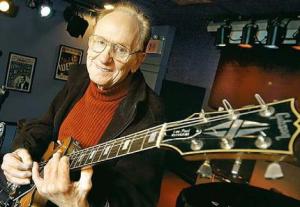
A sad day in music today as one of the older trailblazers, Lester “Les Paul” William Polfuss passed away. He was 94. Born only a few short years after the sinking of the Titanic, Paul lived through two World Wars, numerous armed skirmishes, the Depression, three “first” Supreme Court Justices as well as the first African-American president. But in a life that spanned all of those historic events, his contributions to music, the recording industry and the guitar dramatically changed the way it was created, played and recorded on a level unparalleled elsewhere.
Not only was Paul an accomplished musician, but his DIY tendencies and desire to see how things worked lead him to develop technology that shaped the future of the music industry and huge developments within genres. The standard of multitrack recording was pioneered by Paul, and the practices of overdubbing and delays were advanced by him as well. Dissatisfied with the acoustic guitars available, Paul created his own electric guitar. This would go on to be manufactured and sold by Gibson, becoming one of the iconic guitars for rock musicians from multiple generations. Certainly we may not have had the Steve Miller Band were it not for Paul being Miller’s Godfather and giving him his first guitar lesson. I’ve also read that when he broke his arm he asked the doctor to reset it in a permanent guitar playing position. I can neither confirm nor deny that.
When it comes to instrumentation and studio techniques, few people in the recording industry have had as much of an impact as Les Paul. His influence and love for music was so great that he continued playing guitar into the last year of his life, and created continued inspiration for premier guitarists worldwide. In a musical climate where “innovation” comes in the form of auto-tune and artists rarely have more than monetary attachments to the instruments they play, Paul’s truly significant leaps of technology and his subsequent engineering attachment to the instruments he created will remain singular and unique for some time to come.



